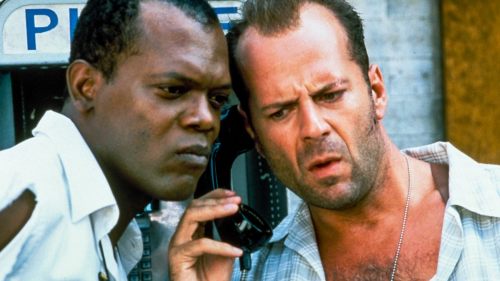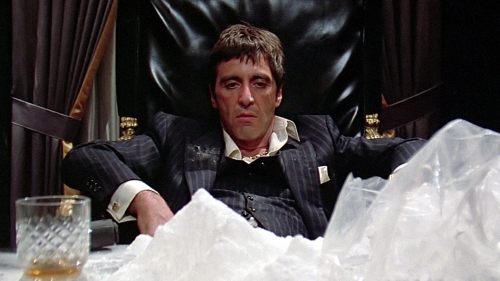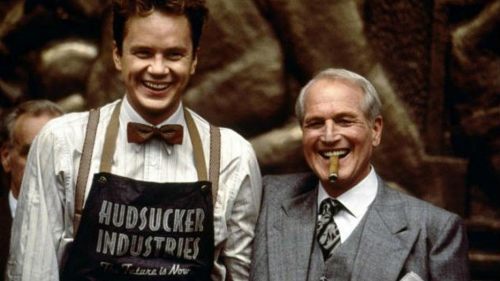Approaching The End: NO COUNTRY FOR OLD MEN At 10
When Paramount Vantage - the filmmaker-forward arm of Paramount Pictures (formerly known as Paramount Classics) - folded in '13 (after its ultimate release, Nebraska, netted six Oscar nominations, including Best Director and Picture), the studio scene lost a major wing through which "art house" movies could find an audience. Throughout their fourteen years of existence (since Classics first put out Trekkies in '99), the company evolved from distributing headier genre fare (such as Brad Anderson's The Machinist ['04]) to bona fide Academy Award contenders like Alejandro González Iñárritu's Babel ('06). Vantage's most prolific year occured in '07, when they not only put out Sean Penn's Into the Wild (which earned Hal Holbrook a well-deserved Best Supporting Actor nod), but also Paul Thomas Anderson's There Will Be Blood, which contained what is arguably Daniel Day-Lewis' most iconic turn.
But the big winner that year was the Coen Brothers' No Country For Old Men - a sparse, stripped down iteration of Cormac McCarthy's already sparse, stripped down existential crime novel - which won Best Picture, Director(s), Adapted Screenplay, and Javier Bardem defeated Holbrook in the Supporting column (though his cold-blooded specter of death, Anton Chigurh, may even edge out Daniel Plainview in the recognizability department). Many cinephiles (not to mention critics) often argue that the Academy never gets it right, holding up numerous instances that back up their claim (hello Goodfellas losing to Dances With Wolves in '91). However, No Country besting There Will Be Blood (in a field that also included Atonement and Michael Clayton) just felt correct. One could obviously still prefer one picture over the other, yet it was a difficult choice to argue against.
No Country For Old Men is undoubtedly one of the Coens' bleakest genre exercises; a story so soaked in elemental atmosphere that even though the Brothers' regular musical collaborator, Carter Burwell, is again credited with the original score, it'd be tough for anyone to pick out a defining cue. In Hollywood, so many thrillers find their tension built around music, especially in more overt set pieces (think: Alfred Hitchcock or Brian De Palma). In No Country, there are long stretches of silence, where we hear the wind whistle over the hard desert, or the clomp of our next door neighbors' feet as they enter an adjacent dingy motel room. Burwell was instrumental in that decision, tailoring a score that's emanating from the enviroment, utilizing abstract metallic sounds, a faint bit of percussion, or just strings whispering in the dark. We're always on edge because we're always isolated, with no outside sound to warn us of the danger to come.
The year is 1980, though it's tough to tell until a local Marshal spells it out for us at one point. Sure, the Jeeps and pick-ups that Llewelyn Moss (Josh Brolin) finds in the desert outside Del Rio while hunting are a little old and beat up, but one suspects these Texas shit-kickers keep their reliable vehicles rolling for as long as they can. Strewn in the dirt around these beaters are a bunch of dead Mexicans and several different shell casings, varying in caliber. Whatever this jackpot was, it went wrong fast, and it probably had something to do with the load of brown dope in the bed of one pick-up. Welcome to the Texas border, where heroin trafficking is increasing; America's bullshit "war on drugs" failing on all fronts, as a secret industry moves into downtown Dallas boardrooms, bringing savage men of violence with it.
Sherriff Ed Tom Bell (Tommy Lee Jones) knows that the world has begun to move past him and those who think similarly. In the movie's introductory narration, he craggily reminds us of old time lawmen, who didn't even feel the need to wear a gun in the counties they patrolled. These days, they wouldn't last a second, as basic morality went out the window with "sir" and "ma'am". So, while we may struggle to recognize which era No Country For Old Men is set in at first, Ed Tom most certainly feels the passage of time, reflected perfectly on Jones' weathered mug (which might as well be the insides of a tree, its rings able to describe just how ancient it feels). By the end of this sordid crime, Ed Tom will be retired, relaying dreams to his lovely wife Loretta (Tess Harper) over breakfast, their bleak, portentous meanings not entirely lost in translation.
Roger Deakins has always been one of the greatest cinematographers to ever step behind a camera, but '07 was a high water mark by even his lofty standards, as the two Westerns he photographed are stunning acts of celluloid wonder, both working in service of exploring the souls of lost men. Andrew Dominik's The Assassination of Jesse James By the Coward Robert Ford found Deakins lensing a legend, desconstructed and then re-assembled into what is essentially the Barry Lyndon ('75) of outlaw movies.Tinged with the mournful orchestration of Nick Cave and Warren Ellis, Deakins' camera turns The Assassination of Jesse James into a melancholy poem for the broken and shameful gunslingers we thought we knew.
No Country For Old Men sees Deakins creating an apocalyptic B-Side to Domink's Kubrickian fields of gold, as the West Texas Moss calls home looks like it's already been ravaged by war once we arrive. Yet there's also a scorched earth beauty that Deakins discovers in these old brown sedans penetrating the blackness of night, motel signs lighting up the highways ahead with bursts of garish neon. When the sun is up, we can practically feel its heat beating down on our neck, as Llewelyn scrambles to keep the money he discovered at the scene of that shooting from entering the hands of the relentless hitman (Bardem) pursuing him. Just as Burwell's music is ethereal and unobtrusive, Deakins frames each moment like a patient documentarian, artfully delivering the decline of all things while our central man of action still believes he's got a shred of hope for survival.
Though they've always been aces in the casting department, No Country For Old Men might be the Coens' towering accomplishment when it comes to matching actors with material. Josh Brolin was essentially born to play Moss - a no-nonsense, two-tour 'Nam vet of little words but plenty of instinct. Brolin slides into the monosyllabic trailer park dweller's boots so comfortably that it's often easy to forget you're watching a performer onscreen. But the true gems come when Llewelyn interacts with his young wife, Carla Jean (Kelly Macdonald). Brolin and Macdonald share a loving chemistry reminiscent of Marge and Norm Gunderson, only transplanted into West Texas. Had Llewelyn never stumbled across that bag of money, one posits that the two probably would've lived happily ever after, poor but still fine with simply having each other.
Anton Chigurh is one of the great monsters of any cinematic era, entering with an air gun usually used to slaughter cattle that he silently dispatches his prey with. At one point, Ed Tom describes him as "a ghost", and that'd feel eerily accurate if weren't for the idiosyncratic touches the Spanish superstar injects into this Terminator. Everything about Chigurh's actions are methodical and measured, but he still questions the final moments of his victims' lives, like an alien researcher attempting to mine data on basic human emotions. Speaking in cryptic riddles and challenging shopkeepers to coin tosses that will decide whether they live or die, Chigurh is the arbitrary nature of death made flesh, perfectly satisifed with his position as its dealer, though unexpectedly mortal when a car blows a stop sign and randomly threatens his life. Living and dying is a game of chance in this universe; Llewelyn simply stacked the deck against himself by stealing from Chigurh's employers.
No matter how great Brolin and Bardem are, Jones is the wounded soul of No Country For Old Men. Acting almost like a drawling Greek Chorus for the chaotic events that've invaded his home, his response to crime scenes and the litany of corpses contained therein is quiet resignation, all while his deputy (Garret Dillahunt, tying No Country and Assassination of Jesse James together with another colorful bumbler) tries to get a grip on the world he's going to have to exist in long after Ed Tom has retired. Near the end - after Llewelyn is killed and Chigurh seems to have vanished into thin air again - the Marshal wonders aloud how low God's opinion of him truly is. For Ed Tom knows that his kind have lost to this new breed, the collective fingers of civility no longer able to put a plug in the dam holding total anarchy back.
Which brings us to the strange ending of No Country For Old Men, which perplexed (and infuriated) many upon the picture's initial release, but marks it as a genuine classic in hindsight. So much of the McCarthy adaptation's runtime is devoted to the cat and mouse antics of Llewelyn and Chigurh, that when the hardened hunter is finally offed by the menacing killer, it happens offscreen, and we discover the body alongside Ed Tom (denying the audience a traditional thriller climax). Now, the lawman has to inform Carla Jean that her man is dead, who in turn is also killed by the same wandering force of destruction, after she denies him the joy of potentially winning her life in another one of his change flips. "The coin don't have no say. It's just you," she tells Chigurh, rejecting her fate as random in an attempt to force the murderer to acknowledge his part in these bloody shenanigans. But Chigurh is nothing if not consistent, and wipes his boots on the way out.
The final scene in No Country finds Ed Tom sitting at his breakfast table, relaying two reveries he experienced the night before to Loretta:
"Both had my father in 'em . It's peculiar. I'm older now than he ever was by twenty years. So in a sense he's the younger man. Anyway, first one I don't remember too well but it was about meeting him in town somewhere, he's gonna give me some money. I think I lost it. The second one, it was like we was both back in older times and I was on horseback goin' through the mountains of a night. Goin' through this pass in the mountains. It was cold and there was snow on the ground and he rode past me and kept on goin'. Never said nothin' goin' by. He just rode on past... and he had his blanket wrapped around him and his head down and when he rode past I seen he was carryin' fire in a horn the way people used to do and I could see the horn from the light inside of it. 'Bout the color of the moon. And in the dream I knew that he was goin' on ahead and he was fixin' to make a fire somewhere out there in all that dark and all that cold, and I knew that whenever I got there he would be there. And then I woke up..."
To try and decode these dreams is almost as futile as attempting to understand the events that transpired and led to the gruesome deaths of Llewelyn and Carla Jean Moss, while Chigurh limps off, one broken arm wrapped in a boy's shirt. There are notions of heaven and finding one's kin in the afterlife contained in the rememberance, but they're not as important as the fact that, retired or active, Ed Tom will still inevitably die, just like the rest of us. He'll possibly reunite with his papa, or not at all, depending on if there's an afterlife. But the world will continue to become increasingly more hostile after he's gone, and all a good man can hope for is some peace after surviving the savagery that's come to define our society. The title No Country For Old Men is slightly deceptive, as age doesn't have anything to do with it. There is no survival of the fittest if death decides it's your day. We're all destined to meet our fathers by the campfire eventually.



